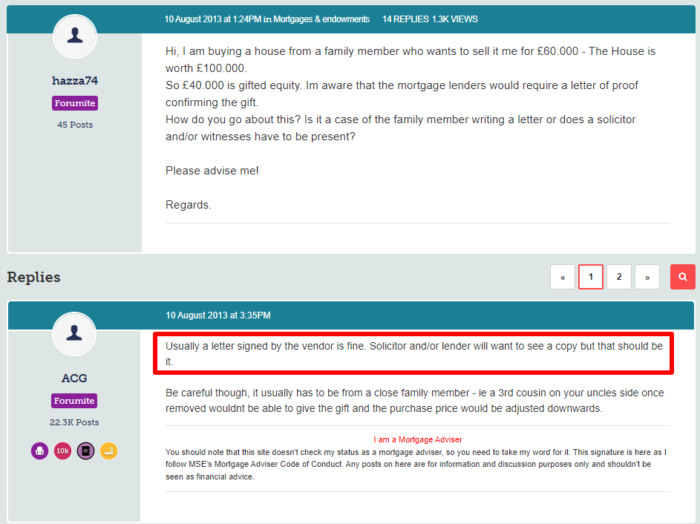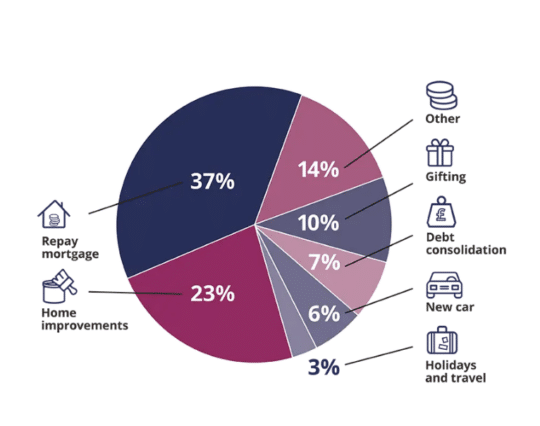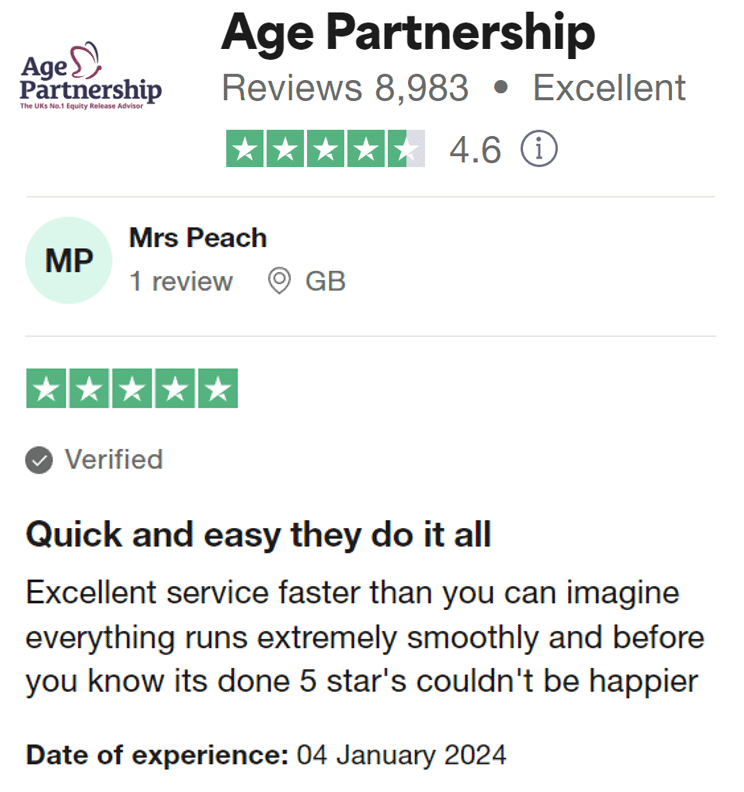Gifting Equity in Property – UK Rules, Warnings & Loopholes
Our preferred equity release adviser is Age Partnership. For free and impartial money advice you can visit MoneyHelper.

Our preferred equity release adviser is Age Partnership. For free and impartial money advice you can visit MoneyHelper.
Are you curious about gifting equity in property in the UK? This article will guide you through the rules, warnings, and loopholes you should be aware of in 2023.
We understand that the process can be a bit puzzling, which is why each month, over 7,000 people visit our website for clear and simple advice on equity release. Here, we’ll answer some key questions, such as:
- What does gifting equity mean?
- How can it help with equity release?
- What impact could it have on your taxes?
- Can you change your mind after gifting equity?
- What other choices do you have?
The Centre for Ageing Better’s study reveals that a million homes in the UK need changes to be better fit for living comfortably, and a third of these homes have someone over 551. This demonstrates the importance of considering options like gifting equity,
We’re here to make things clearer for you and to guide you every step of the way – after all, it’s your home and your future, so you deserve to understand all your options.
Let’s dive in.
How Does It Work?
We first need to look at how equity release works. Equity release leverages some of the value in a property by either a) remortgaging it under a lifetime mortgage, or b) selling part of the equity to a third party in exchange for cash payment.
In both options, the lender would need to wait until the applicant has either died or wishes to sell the property before they get any return on their investment.
Therefore, lenders have very little interest in providing equity release products to people under the age of 55. Simply because they could be looking at thirty or more years before they see any return.
However, if a person under the age of 55 were to gift equity to a person over 55, this person could then apply for equity release. The length of time the scheme would run would be more attractive to a lender.
How It Helps with Equity Release
When you gift equity to somebody over the age of 55, you are enabling them to use this equity as collateral to apply for an equity release product. Either a lifetime mortgage or a home reversion type of product.
The person who has been gifted equity would need to prove to a lender that they are, in fact, the sole or co-owner of the property before they can successfully apply for equity release.

A Comparison
I’ve put together this table to help you better understand the differences between a home reversion plan and a lifetime mortgage. If you want to learn more about equity release, make sure to read our detailed guide.
| Category | Home Reversion Plan | Lifetime Mortgage |
|---|---|---|
| Ownership of the Property | You will sell either a portion of or the whole value of the home and then be allowed to stay on the property as a tenant. The lender will become a co-owner. | When you take out the secured loan against the property, it will remain in your ownership until you pass/move into long-term care. |
| Change in Value of the Property | With a co-ownership, you will be directly impacted by the property’s value in current markets. This means that you could just as easily lose out on money in the case of a value decrease as you could benefit from an increase. | Since this loan is typically paid off by the sale of the property after passing/owner is moved into long-term care, the value of the home after this case may impact how much money will be left to the estate/family once it has been sold. |
| Inheritance | While some plans do offer a guaranteed inheritance amount, it is likely that the inheritance will be dramatically reduced because you’ve sold a large portion of the property. | Some lifetime mortgages allow for an inheritance protection scheme, but the overall inheritance amount is decided by the loan size and accrued interest. |
| Repayment | No repayment required during your lifetime. It will be paid back once the property is sold. | Some lifetime mortgages allow for partial, voluntary repayments during your lifetime. However, the majority of the loan will be paid back once the property is sold. |
| Type of Payment | There is a choice between a lump sum payment or a regular income with this loan. You can also choose a mixture of the two. | You can either receive a lump sum loan, or you can choose a drawdown facility which allows you to take out money whenever you need it. |
Our financial expert, Janine Marsh, says: ‘a lifetime mortgage is definitely the most popular of the two options, especially considering the second option isn’t technically a loan (you won’t need to pay interest on it). Both types of equity release should be considered carefully as there is risk involved.’
How equity release could help
More than 2 million people have used Age Partnership to release equity since 2004.
How your money is up to you, but here’s what their customers do…
Find out how much equity you could release by clicking the button below.
In partnership with Age Partnership.
Will Doing It Impact the Tax Position of the Person Gifted?
A major consideration when gifting equity for a jointly owned property, is how this will affect the tax position of the person who receives the gift. There are three main considerations with regard to tax and gifting property, and these are:
- Whether the property is/was your main home or residence.
- Who you gifted the equity to (a family member or a person you are not related to).
- The value of the gift, and whether it is over the tax-free threshold.
As an example, if you were to gift equity in your main residence, to a member of your family, and the value of the gift is below the tax-free threshold, the gift would not be taxed. However, gifts to a person who is not family, are over the tax-free threshold, or the equity is not tied up in your main residence, will be taxable.
A further consideration is how the change in equity share could have an impact on inheritance tax, following the death of the party that has been gifted a share of the equity.
Join thousands of others who release equity
Age Partnership have helped over 2 million people release equity from their home.

Mrs Wareham
“I am more than pleased to have taken out Equity Release with Age Partnership.”
Reviews shown are for Age Partnership. Search powered by Age Partnership.
Can It Be Reversed?
There are equity release horror stories, where a person has been gifted equity, and then simply held on to it, and not used it to apply for an equity release scheme. And in such cases, it is generally not possible to have the gift reversed legally. Not unless the following two statements are untrue:
- The person who made the gift was in sound mind and capable of making such a decision.
- The gift was given voluntarily.
There is the old adage here, that you can choose your friends but not your family. We all like to think we can trust family members. However, you must be 100% sure you can do so before you voluntarily gift one of them equity.
Is Giving and Receiving It Regulated in the UK?
The actual giving and receiving of equity is a personal thing, between two people. It is not regulated in the way some financial transactions are. However, when it comes to selling equity release products based on a gift of equity, there are some rules and regulations in play.
The Financial Conduct Authority (FCA), lays down some very strict guidelines for how financial advisors should approach encouraging homeowners to gift equity, to enable the application for an equity release scheme.
» TAKE ACTION NOW: Fill out the short debt form
Are There Any Alternatives?
Gifting equity may not be the most sensible or even possible option for you to help free up equity in your property. However, there are a couple of viable options that may be suitable in some cases, and we go over these below.
- A secured loan, using the property as collateral – this would only be a viable route if you are looking for a lump sum cash payment and not regular payments.
- Remortgaging the property – if the value of your home has increased since you purchased it, then remortgaging it could see you with a substantial cash deficit after the transaction.
Is It the Right Choice for You?
A gift of equity is a clever, simple way to get over the hurdle of applying for equity release if you are under 55 years of age. However, we do need to give the following warnings.
- Ensure that you can implicitly trust the person you are gifting the equity to.
- Fully research the tax implications of making such a gift.
- Make sure to shop around to get the best deal on an equity release scheme.


